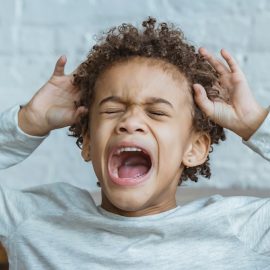
This is a free excerpt from one of Shortform’s Articles. We give you all the important information you need to know about current events and more.
Don't miss out on the whole story. Sign up for a free trial here .
What causes seasonal depression? How common is the disorder? What are some ways to prevent or treat the symptoms?
When the days get darker and colder, it’s hard not to feel a little down. But sometimes the “winter blues” are something more—seasonal depression—a surprisingly common form of depression.
Keep reading to learn what causes seasonal depression, who it affects, and what you can do to help it.
Seasonal Depression Isn’t Just the “Winter Blues”
Have you ever felt depressed once the dark days of winter set in, or felt less interested in your work once you turned your clocks back for the season? You might be experiencing seasonal depression, also called seasonal affective disorder (SAD).
Like other forms of “major” or “clinical” depression, seasonal depression can cause feelings of sadness and anxiety, reduced energy, a lack of interest in the activities you usually enjoy, changes to your sleep patterns and eating habits, difficulty concentrating, and thoughts of death or suicide. The symptoms can be severe and can interfere with your work, relationships, and health. And because they can last for up to 40% of the year for some people, the effects of seasonal depression are a lot longer-lasting than you’d expect for something that people shrug off as the “winter blues.”
What Causes Seasonal Depression?
Researchers aren’t sure what causes seasonal depression. But they have a few theories:
Fewer Hours of Sunlight Might Be to Blame …
Many people have noticed that the arrival of shorter, darker days seems to kickstart their symptoms. And researchers think that a lack of sunlight might interfere with the body’s release of melatonin. Winter’s longer hours of darkness can disrupt your body’s rhythms. That makes it harder to get up in the morning, harder to fall asleep at night, and harder to cope with depressive symptoms.
Maybe Our Bodies Want to Hibernate
Another theory attributes seasonal depression to the human equivalent of an instinct for hibernation. Paul Desan, a psychiatrist at Yale’s Winter Depression Research Clinic, explains that an increased appetite and a need for more sleep are two of the most commonly reported symptoms of seasonal depression. As he points out, these symptoms make it sound like our bodies are trying to hibernate for the winter.
Similarly, University of Toronto psychiatrist Robert Levitan explains seasonal depression as a combination of an evolutionarily adaptive (or useful) instinct to conserve energy in the winter combined with a maladaptive urge to withdraw from social activity.
Expectations Are Also Powerful
Additionally, some experts think that when people anticipate feeling sad or down during the winter months, that expectation also has an effect on how they actually feel when the coldest and darkest days of the year arrive. These negative associations are so strong that some researchers question whether the seasons’ change is really to blame for seasonal depression at all.
How Common Is Seasonal Depression?
Some researchers estimate that 5% of adults in the US experience seasonal depression, while others put the number closer to 10%. To be diagnosed with seasonal depression, a person has to have seasonal symptoms that occur for at least two years.
It’s most common for seasonal depression to set in in the late fall. Experts say that the disorder occurs more often in women than in men and in people who live in northern regions of the United States rather than southern regions.
How Can You Prevent or Treat Seasonal Depression?
Noticing a seasonal pattern in your mood or thinking can help you identify whether you might be experiencing seasonal depression. To look for these patterns, some experts recommend keeping a journal. They explain that if you’ve been feeling down for more than two weeks, or you’re finding that your symptoms have been interfering with your daily life, then it’s a good time to see a mental health professional.
Experts have identified several evidence-based treatments that can help you feel better, even if the end of winter is still a long way off. These include:
- Light therapy, which involves sitting in front of a light box or lamp that mimics bright outdoor light for about 30 minutes at the beginning of your day.
- Psychotherapy, especially cognitive behavioral therapy (CBT), can help you reframe your negative thoughts about winter.
- Antidepressants like selective serotonin reuptake inhibitors (SSRIs) might be recommended by your doctor.
- Vitamin D supplements might also help, since a deficiency of vitamin D seems to exacerbate seasonal depression. But results of research into the effectiveness of vitamin D supplements for seasonal depression have been mixed, so it’s best to ask your doctor.
- Time outdoors can also help lift your mood and improve your mental health, even when it’s cold outside.
Researchers haven’t found much evidence yet on whether you can effectively prevent seasonal depression. But experts say that since the onset of seasonal depression can be predictable for people who experience it every year, it might be worth it to take some steps to prepare.

Want to fast-track your learning? With Shortform, you’ll gain insights you won't find anywhere else .
Here's what you’ll get when you sign up for Shortform :
- Complicated ideas explained in simple and concise ways
- Smart analysis that connects what you’re reading to other key concepts
- Writing with zero fluff because we know how important your time is






